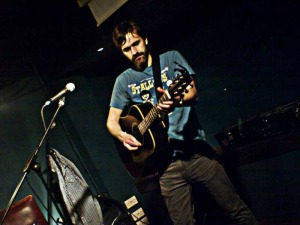Perth Concert Hall
25th May 2015
Hats off to the people of Perth who gave gave Pine and Rahman a thoroughly appreciative reception. To listeners of jazz, used to the second half of the genre’s life featuring small ensembles with traps and bass in the rhythm section, or even to Courtney Pine’s ensemble for the album Europa of which Zoe Rahman was part, the concept of a piano and bass clarinet duo can seem strange, almost minimalist. If that is the case for you, then make a point of seeing this duo while their collaborative project is still ongoing. The range of sounds that Courtney Pine can get from the bass clarinet – high squeals from overblowing, buzzing notes below the register of a foghorn, even the percussive effects of the instrument’s keys – is phenomenal. I would have liked to have seen some of his multi-instrumentalism, but that’s just a personal preference and doesn’t in any way take away anything from what he presented in this concert.
“My name is Courtney Pine, and I love jazz,” was his introduction. His performance was full of humour and playfulness, such as the moment when he paused to make the final note of a tune but then said “Nah!” and left it unresolved, and the way he inserted cheeky quotes into some of the tunes, snatches of ‘Smoke Gets In Your Eyes’ or ‘God Rest Ye Merry Gentlemen’, or Bach’s Toccata in D. You may think that is a jazz cliché, and of course it is, but we’re in a post-modern era where eclectic nods and references are to be expected. So in one number he pushed it to the very limit, quoting from Prokofiev’s Peter and the Wolf, Gilbert & Sullivan’s Pirates of Penzance, two Glenn Miller tunes, Acker Bilk’s ‘Stranger On The Shore’, and ‘There’s No Place Like Home’. The set was full of standards and recognisable song tunes such as “A Nightingale Sang In Barclay Square’, Donny Hathaway’s ‘Some Day We’ll All Be Free’, Duke Ellington’s ‘Come Sunday’, and ‘Girl Talk’. The latter was shouty, full of R&B-style blowing. Alongside these were treatments of old-timey faith-songs. There was the Olney hymn ‘Amazing Grace’, and the spirituals ‘Sometimes I Feel Like A Motherless Child’ and ‘Let My People Go’. I think ‘Let My People Go’ was my favourite number of the night – at least it was right up until the duo gave us ‘A Child Is Born’ by Thad Jones and Alec Wilder, which they graced with a beautiful, lyrical treatment.
Zoe Rahman is a performer and recording artist in her own right, with a style all of her own. Some of her solo playing seemed modal, or at some times impressionistic. After the concert I elbowed my way into the queue for CDs to snatch a very brief word with her, telling her I had heard echoes of Gershwin, Errol Garner, Debussy, and McCoy Tyner in her playing. “All my favourites!” she said. As for her partnership on stage with Courtney, it took me a few minutes to get used to. They have distinctly different styles and approaches, and of course play greatly different instruments. However, even though I thought the sound desk had got Zoe’s piano a little too high in the mix, so that on rare occasions the sound of the bass clarinet got a little lost, it didn’t take me long to spot that these two musicians have a marvelous rapport. Her solos were a treat, and her interaction with (rather than call it accompaniment of) Courtney was first class. Tonight’s concert will ring in my ears and be stuck in my head for a long time.
Reviewer : Paul Thompson











